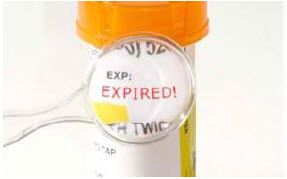The term "expired" indicates that has come to its end. People hate expired medicine to be waste. To save money and avoid a trip to the doctor for a new prescription, many people do take expired drugs.
The expiration date indicated the date the manufacturer guarantees the full potency and safety of the drug. At the time of the medication expiry date, the drug must be at least 90% of the original potency under proper storage conditions. Drug's potency begins to reduce from the moment it is manufactured; it is not in anyway spontaneous after the expiry date. Expiration date doesn’t really indicate a point at which the medication is no longer effective or has become unsafe to use. Once the expiration date has passed there is no guarantee that an expired medicine will be safe and effective.

As per federal law it is mandatory for drug manufacturers to place an expiration date on both prescription and over-thecounter medications. This date, generally two to three years from the date of purchase, signals the length of time the product can be guaranteed to maintain full potency and safety in an unopened package. Using expired medical products is risky and possibly harmful to your health.
[adsense:336x280:8701650588]

CONSEQUENCES OF TAKING EXPIRED MEDICINE: After the expiry date, the product does not necessarily become useless, as it may only have reached the potency limit of the active ingredient. If, however, other physicochemical characteristics (such as pH, dissolution rate of tablets and capsules, particle size in creams and suspensions) have changed, or toxic degradation products reach unacceptable levels, use of the product may be harmful. Due to a change in chemical composition or decrease in potency expired medical products can be less effective or risky. There are certain medications, such as nitroglycerine (used by heart patients for chest pain), insulin (used by diabetics to control blood sugar), and liquid medications such as antibiotics that degrade more quickly than other medications. This means that some of the effectiveness of the medication is lost if used past the expiration date - a serious risk for someone with heart disease, diabetes, or a serious infection.
Some expired medications can become downright dangerous. Some products get degraded if used after their expiration date. The products of degradation are significantly more toxic than the original active pharmaceutical ingredient. For example Tetracycline gets decomposed to epianhydrotetracycline and the decomposed product is shown to cause renal tubular damage. Chloroquine can produce toxic reactions attribute to photochemical degradation.
If the pH of eye drops and other preparations for application to mucous membranes, or injectables, falls outside a fairly narrow range, pain and perhaps tissue damage may result. Creams may "crack" once their expiry date is passed, leading to a separation of the components and hence provide a non-uniform delivery of active ingredients. This can lead to the poor control of conditions like eczema or acne.
Another issue to be considered when taking old medications is that if your physician gave you something two years ago, he or she based that drug selection on the current medications you were taking at that time. Over time, your drugs may have changed and you could be on something now that interacts with that previous medication. The expiration date is not your only concern in taking old medications.
Efficacy is an important factor to consider because it reflects the ability of the drug to produce the desired effect; hence, the higher the efficacy, the better the results. Expired medication may not adequately treat minor conditions or serious conditions because of reduced efficacy. As a consequence, inadequate relief from sickness could eventually lead to longer sick days.
The stability of products is variable. A product which is stable in its container may become unstable once the container is opened. Patients should be advised to store their medicines as recommended and to discard them after the expiry date.
If you have expired medicine, it should be disposed of properly. Read the label for disposal instructions that may be included. If no instructions are provided, a drug take-back program, if available, is a good way to dispose of expired, unwanted or unused medicine. Check with your local government to see if there is a drug take-back program available in your area. If no take-back program is available, federal guidelines recommend throwing medicine away in the household trash by placing it in a bag or container.
It is legally and ethically not permissible to sale medicines after expiry date, the medicines do not really retain full potency as expected when our distribution system including the retail stores does not have the appropriate storage condition as recommended by the manufacturers. The regulatory authorities must ensure appropriate storage throughout the life cycle of medicine to make the expiry date of medicines relevant in the interest of public health.
NOW YOU CAN ALSO PUBLISH YOUR ARTICLE ONLINE.
SUBMIT YOUR ARTICLE/PROJECT AT editor-in-chief@pharmatutor.org
Subscribe to Pharmatutor Alerts by Email
FIND OUT MORE ARTICLES AT OUR DATABASE









